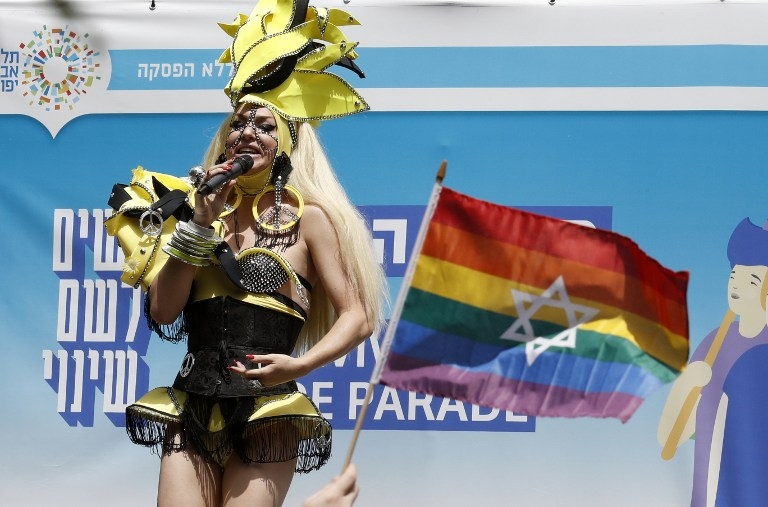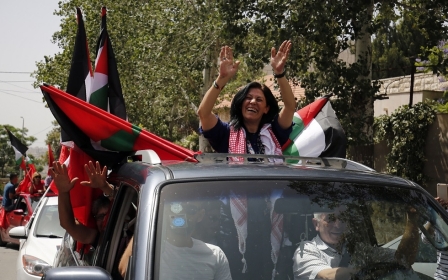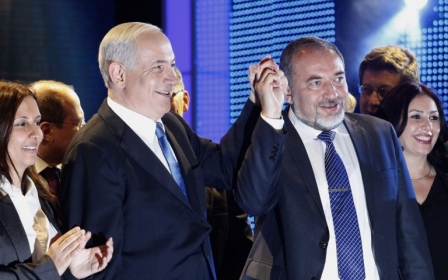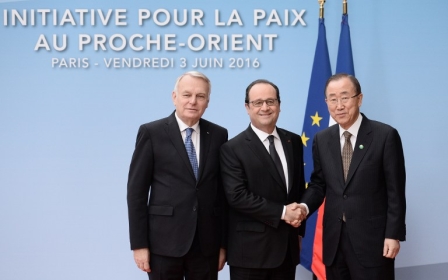LGBT activists accuse Israel of 'pinkwashing' Palestinian occupation

Tens of thousands of revellers took part in Friday's Gay Pride parade in Tel Aviv, an annual event promoted and funded by the city that draws worldwide attention.
But Lesbian, Gay, Bisexual and Transgender campaigners have accused Israel of spending lavishly to paint itself pink in an effort to restore a liberal image tarnished by its occupation of the Palestinian territories.
In the past it was only pro-Palestinian activists who accused the government of pushing its reputation for sexual tolerance as a smokescreen, a tactic referred to as "pinkwashing".
But the LGBT community was mobilised a month before the high-profile Gay Pride with the announcement that the tourism ministry was spending 11 million shekels ($2.86m) on advertising to attract European visitors to the event.
The sum was 10 times the amount of annual state funding for LGBT associations.
"Spending 1.5 million shekels to paint a rainbow on a plane full of tourists, that's ridiculous," said Imri Kalman, co-chair of Aguda, Israel's largest campaign organisation for LGBT rights.
"There was a click and we woke up," he said.
"We finally understood the hypocrisy of this government and this prime minister, who boasts in English abroad about the freedom enjoyed by homosexuals in Israel but never the utters the word in Hebrew when he gets home."
After a threat by campaigners to cancel the annual gay parade this year, the community decided to bargain for a bigger share of state aid.
The finance ministry acquiesced, announcing it would give gay and transgender groups 11 million shekels - equal to the publicity campaign - over three years.
Tolerance toward gays in Israel can evaporate outside the cultural enclave known as the "Tel Aviv Bubble".
A 16-year-old girl was stabbed to death by an ultra-Orthodox man as she took part in Jerusalem's Gay Pride parade last year.
Nevertheless, Israel is seen as progressive in terms of the visibility and equality of the LGTB community.
The army, often seen as a conservative institution, is open to gay and transgender soldiers.
Same-sex marriage is not performed in Israel, where no civil ceremonies are allowed, but when a couple marries abroad the union is recognised by the authorities back home.
Many practical advances in status and legal standing have been won by appealing to the Supreme Court after legislation in favour of gay rights encountered parliamentary opposition owing to the conservative instincts of both orthodox Jewish and Muslim members of the Knesset.
Amir Ohana, one of the two openly gay MKs in the present parliament, is a member of Prime Minister Benjamin Netanyahu's rightwing Likud party.
He says Tel Aviv is one of the few cities in the world where he can walk with his male spouse, pushing their two babies without it surprising anyone.
"It's very good that we have something to be proud of in this country and that is LGBT rights," he said.
"I only wish that one day we could stage a 'pinkwashing' contest throughout the region."
Fadi Khoury, a young Palestinian Israeli LGBT activist, thinks the community has been too passive. He boycotted this year's parade and invited Jewish fellows to do the same.
"Israel wants to rebrand itself as a liberal democracy - despite the occupation - by claiming that neighbouring societies, especially the Palestinians, aren't as tolerant towards sexual minorities," he said.
"A moral human rights struggle cannot be one that is partial. The state is the same source of human rights infringements for both the Israeli LGBT community and the Palestinians under occupation."
New MEE newsletter: Jerusalem Dispatch
Sign up to get the latest insights and analysis on Israel-Palestine, alongside Turkey Unpacked and other MEE newsletters
Middle East Eye delivers independent and unrivalled coverage and analysis of the Middle East, North Africa and beyond. To learn more about republishing this content and the associated fees, please fill out this form. More about MEE can be found here.




